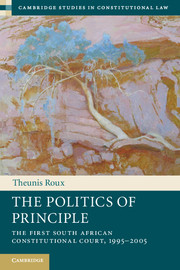Book contents
- Frontmatter
- Contents
- Acknowledgements
- Introduction
- Part I Problematic, Theory, Methodology
- Part II Context
- Part III Thematic Case Studies
- 6 Death, desire and discrimination: the Chaskalson Court between constitutional and positive morality
- 7 Social rights
- 8 Property rights
- 9 Political rights
- 10 Cross-cutting strategies
- Conclusion
- Bibliography
- Index
9 - Political rights
Published online by Cambridge University Press: 05 April 2013
- Frontmatter
- Contents
- Acknowledgements
- Introduction
- Part I Problematic, Theory, Methodology
- Part II Context
- Part III Thematic Case Studies
- 6 Death, desire and discrimination: the Chaskalson Court between constitutional and positive morality
- 7 Social rights
- 8 Property rights
- 9 Political rights
- 10 Cross-cutting strategies
- Conclusion
- Bibliography
- Index
Summary
The Chaskalson Court’s political rights jurisprudence presents something of a paradox: a group of rights, the enforcement of which even some judicial-review sceptics regard as reconcilable with a foundational commitment to democracy, was the group of rights in respect of which the Court’s decisions were least convincing. Can the conceptual framework and broader argument of this book help to resolve this puzzle?
To a large extent, yes, this chapter argues. As we saw in Chapter 4, the political context in which the Court found itself was very different from the sort of well-functioning democracy liberal constitutional theory typically assumes to be a necessary condition for independent judicial review. Although much of this book has been directed at refuting this assumption – at showing how the Chaskalson Court was able to turn the ANC’s domination of post-apartheid politics to its advantage – the logic of the Court’s exceptionalist trajectory broke down in relation to political rights. However justifiable in democratic theory, the enforcement of rights to political participation posed a direct threat to the ANC’s political hegemony. The principled enforcement of these rights was therefore hard to accommodate within the Court’s overarching strategy. It was as though the ordinary assumptions of liberal constitutional theory were again turned on their head, only this time to reverse effect: the role of constitutional courts in opening up the democratic system to marginalised groups, which is the role that seems most easily justifiable in a mature democracy, is precisely the role that the Chaskalson Court found hardest to perform.
- Type
- Chapter
- Information
- The Politics of PrincipleThe First South African Constitutional Court, 1995–2005, pp. 334 - 364Publisher: Cambridge University PressPrint publication year: 2013

